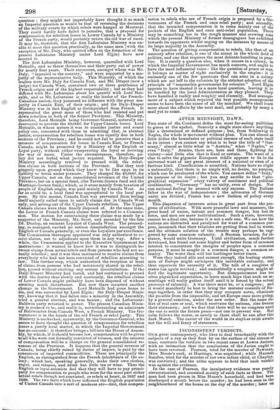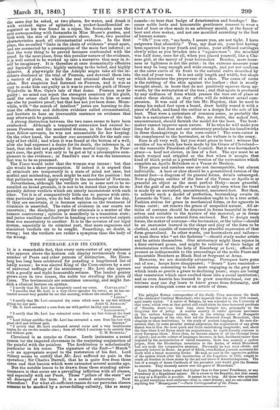INCONSISTENT VERDICTS.
OUR great contemporary, who likes to deal trenchantly with the subjects of a day as they float by on the surface of the stream of time, contrasts the verdicts in two recent cases at Lewes Assizes, with an intimation that the conclusions of the Juries ought to have been reversed. Pearson, tried for the murder of Newman, Miss Moore's cook, at Hastings, was acquitted ; while Hannah Sandles, tried for the murder of her own infant child, at Chayley, was convicted; and the critic appears to hold that each verdict was against the evidence.
In the case of Pearson, the inculpatory evidence was purely circumstantial, and consisted mainly of such facts as these. The man had been groom in Miss Moore's household, and had been discharged a month before the murder; he had been seen in the neighbourhood of the house on the day of the murder ; later on the same day he milted, at two places, for water, and drank it with evident signs of agitation ; a pocket-handkerchief re- cognized as his was found in a copse, the footmarks near the spot corresponding with footmarks in Miss Moore's garden, and both with the size of the prisoner's shoes. Now, two peculiar characteristics mark all circumstantial evidence. In the first place, the so-called "links in the chain of evidence" stand apart, and are connected by a presumption of the main fact inferred; so that the very thing to be proved becomes confounded with the proof. In the next place, from this peculiar nature of the evidence, it is well suited to be worked up into a narrative that may in it- self be imaginary. It is therefore at once dramatically effective and logically defective; highly enticing to the belief, and highly delusive. A playwright for the Adel* might take all the in- cidents disclosed at the trial of Pearson, and dovetail them into a variety of plots, in which the real criminal should vary as often. But suspicion had fastened on Pearson, and it was as easy to make him out guilty as it was to prove the guilt of Henry Woodville in Mrs. Opie's tale of that name. Pearson may be guilty: no mind can reject the strongest suspicion of his guilt, until the crime shall have been brought home to him or some one else by positive proof; but that has not yet been done. Mean- while, with "the march of intellect" juries are learning to dis- trust the effective and defective evidence called circumstantial, and hesitate to base an irrevocable sentence on evidence that may afterwards be gainsaid. A strong distinction between the two cases seems to have been overlooked. Although a temporary connexion had existed be- tween Pearson and the murdered woman, in the fact that they were fellow-servants, he was not accountable for her keeping. On the other hand, the mother was accountable for the safe cus- tody of her child; and when it was found at the bottom of a well, after she had expressed a desire for its death, the inference is, at least, that she had not guarded it from mortal injury. In Pear- son's case, the guilt was only to be got at by a presumptive com- plement to the evidence; in Sandles's case it was the innocence that was to be so presumed. The Times would infer that the woman was insane : but that also would be a sheer presumption. If indeed it is argued that all criminals are temporarily in a state of mind not sane, but morbid and misleading, much might be said for the position : but that palliation would apply equally to the murderer of Newman.
Nevertheless, although the verdicts are in some sort to be re- conciled on broad grounds, it is not to be denied that juries do re- peatedly deliver verdicts which are utterly inconsistent with each other. Yet it is of comparatively little use to pursue with criti- cism particular juries, who do but reflect the feelings of the day. If they are uncertain, it is because opinion on the treatment of criminals is unsettled. The rules of evidence in our courts are uncertain ; the discipline proper for criminals is a matter of the keenest controversy ; opinion is manifestly in a transition state; and juries vacillate and faulter in handing over a wretched culprit from one uncertainty to another. It is in the revision of our legal system, especially in its criminal part, that more sagacious and Consistent verdicts are to be sought. Something, no doubt, is wrong ; but the verdicts are rather a symptom than the body of the wrong.



























 Previous page
Previous page